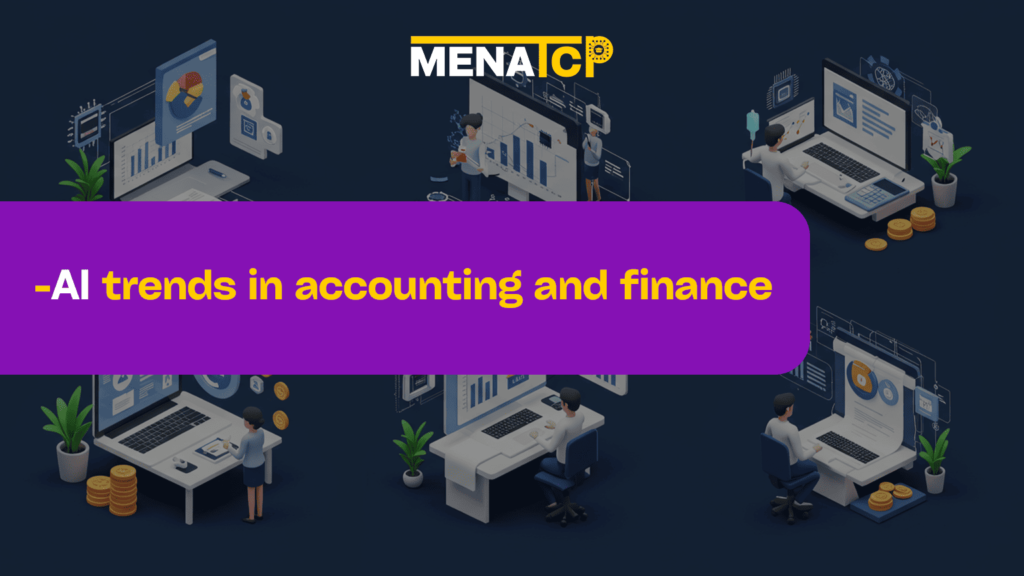The integration of artificial intelligence is the new trend in many industries and in finance it’s no secret that it’s game changing, reshaping the accounting and finance sectors. With AI tools for accounting and finance, AI is optimizing processes, enhancing accuracy, and driving strategic decision-making. Here’s an insight on the new trends in finance showcasing Its impact on the industry.
1. RPA in Finance:
AI tools for accounting and finance are streamlining tasks that once took time and effort with no real value , such as data entry, invoice processing, and bank reconciliations. The use of artificial intelligence in accounting reduces manual errors and gives professionals time and space to focus on other tasks that need human judgement. RPA is software technology that mimics human actions. It can handle repetitive tasks that humans usually do and processes large volumes of transactions, making workflows faster and more accurate.
2-Virtual Financial Assistants:
AI-powered virtual financial assistants are enhancing the customer service sector. These smart chatbots and voice assistants can help clients through alot. They can provide personal financial advice, help with account management, and simplify transactions. Thanks to their use of natural language, these assistants offer smooth, user-friendly experiences. This ends up enhancing customer satisfaction and loyalty.
3- AI-Powered Forecasting and Budgeting:
AI-powered forecasting and budgeting revolutionize financial planning by using advanced algorithms to analyze huge datasets. Through a comprehensive analysis, AI facilitates the generation of highly accurate results. It allows finance teams to make more strategic decisions and find resources more effectively.
Unlike traditional models, AI-driven systems offer a dynamic edge. These offer real-time adjustments based on changing data inputs and feedback. This adaptability enables professionals to respond faster to changing market dynamics allowing forecasts and budgets to remain relevant and reliable.
Thorough these AI tools for accounting. Organizations can then identify risks, opportunities, and alternative strategies to mitigate threats and make use of opportunities.
4- Personalized Financial Advisory Services:
With natural language processing (NLP) and AI-driven chatbots, businesses can offer tailored financial advice to clients. These tools provide insights on budgeting, investment planning, and tax strategies, ensuring a personalized experience that aligns with clients’ financial goals, making the process easier for both businesses and clients.
5- Blockchain Integration:
The combination of AI tools for accounting and finance with blockchain brings new, and secure ways for financial transactions. AI can revise blockchain data to detect fraudulent activities, ensure rule compliance, and streamline transactions. This combination merges blockchain’s secure nature with AI effectiveness . Financial institutions can thus increase their security and efficiency. They can also cut costs and manage risks.
6- Predictive Risk Analytics:
AI’s predictive capabilities have a huge influence over risk management. Thanks to machine learning models, financial forecasts, That were once filled with uncertainties, are now handled with precision and foresight. These work by analyzing massive amounts of data to uncover hidden patterns, anomalies, and risks that may undermine a company’s financial stability.
AI tools for accounting and finance like AI-powered risk analytics can also help finance teams identify potential fraud or unethical practices within the organization. This helps them mitigate these risks before they escalate into more serious problems. For example, AI can flag suspicious transactions or irregularities in financial reports, allowing finance teams to investigate and take necessary action.
7- Training and Skill Development:
As AI tools become essential, professionals must adapt. The benefits of AI in accounting are maximized when employees are equipped with the knowledge to operate and interpret AI-driven insights. Training programs focused on AI tools and ethics in accounting are essential for future readiness.
8- Cloud-Based AI Solutions:
Cloud-based AI platforms are transforming accessibility and scalability in finance. They enable real-time collaboration, secure data sharing, and seamless integration across multiple systems. Organizations adopting these solutions benefit from cost-effective and agile operations.
The adoption of AI tools for accounting and finance is revolutionizing the industry, making processes more efficient and insightful. Embracing innovations like AI tools for accounting positions businesses for success. This integration of AI is revolutionizing accounting and finance, and embracing these trends is mostly important for both individuals and businesses so you can stay ahead in an evolving market.
